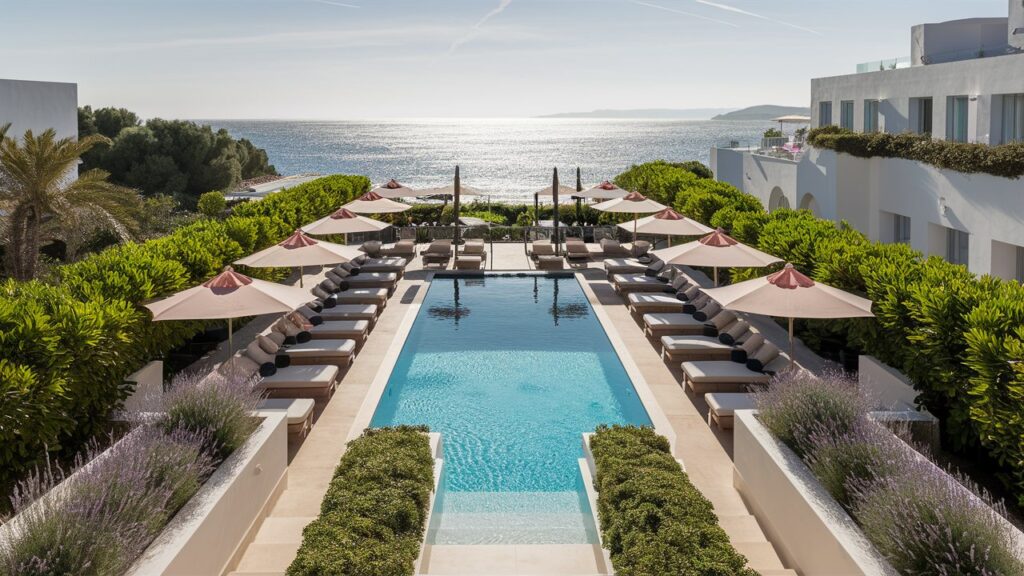The hotel industry, essential to global tourism, faces many challenges, including that of mosquitoes. These insects are not only a nuisance for guests, but also pose significant health risks by being vectors of serious diseases such as malaria, dengue fever and the Zika virus.
In Ibiza, a popular Balearic destination, the Mediterranean climate favors their proliferation, impacting the visitor experience and the reputation of hotel establishments. Here are the impacts of mosquitoes on the hotel industry, with a particular focus on Ibiza. As well as solutions for mitigating these negative effects in innovative and environmentally-friendly ways.
The global impact of mosquitoes on the hotel industry
Mosquitoes represent a major threat to the global hotel industry due to their impact on public health, the economy and guest satisfaction. They are vectors of serious diseases such as malaria, dengue fever and the Zika virus, posing significant health risks for hotel guests. In Africa, for example, malaria causes substantial economic losses in tourist areas, estimated at billions of dollars every year.
The economic costs associated with mosquito management include expenditure on preventive measures, such as the installation of mosquito nets, the use of repellents and pesticides, and the maintenance of outdoor environments to eliminate mosquito breeding grounds. These costs can weigh heavily on hotels’ operating budgets, especially in tropical regions where mosquitoes are ubiquitous.
In terms of customer satisfaction, mosquitoes can seriously damage the visitor experience. Complaints about mosquito bites can lead to negative online reviews, affecting the reputation of establishments. A study carried out in 2020 revealed that hotels in areas of high mosquito infestation receive 15% more negative reviews than those in areas of low infestation.

The specific impact of mosquitoes on Ibiza’s hotel industry
Ibiza, with its warm, humid Mediterranean climate, is particularly prone to mosquito proliferation, which directly affects its hotel industry. The island’s establishments have to manage the nuisance and health risks associated with mosquitoes, particularly disease-carrying species such as the tiger mosquito (Aedes albopictus). The latter, known to transmit diseases such as dengue fever and chikungunya, is increasingly present on Ibiza due to global warming and increased international travel.
Luxury hotels invest heavily in preventive measures to protect their guests. These include the use of mosquito traps, the regular application of repellents and the installation of physical barriers such as mosquito nets. These efforts are aimed at maintaining high customer satisfaction and avoiding negative reviews, which can seriously damage the reputation of establishments. These solutions are often costly, environmentally unfriendly and ineffective.
Feedback from hoteliers indicates that the presence of mosquitoes can significantly reduce booking rates, especially during the summer months when infestations are most intense. Guests, often dissatisfied with bites and nuisance, may choose alternative destinations, thus negatively impacting hotel revenues. Local initiatives, such as awareness campaigns and mosquito control projects by local authorities and private organizations, are essential to mitigate these impacts.
Solutions and preventive measures for hotels
To mitigate the impact of mosquitoes on the hospitality industry, various solutions and preventive measures can be put in place. Modern technologies play a crucial role. For example, the installation of innovative mosquito traps, such as the Qista by Mosquizen mosquito bollards, can effectively reduce the mosquito population around hotels. These devices attract mosquitoes by mimicking human body odor, and trap them before they can bite guests.
Landscaping is another key strategy. Hotels can plant natural repellents such as lemongrass, lavender and geranium around outdoor living areas to create a natural barrier against mosquitoes. By eliminating stagnant water where mosquitoes breed, establishments can also significantly reduce the presence of these insects. For example, hotels in Ibiza have begun to use improved drainage systems and regular treatment of water bodies with ecological larvicides to prevent the proliferation of mosquitoes.
Customer and staff awareness is essential. Informing customers about best practices for avoiding mosquito bites, such as wearing long clothing in the evening, can reduce incidents of biting. Training staff to recognize and eliminate potential mosquito breeding grounds also helps to maintain a safer, more pleasant environment for all.
Conclusion
By integrating innovative, eco-friendly Qista by Mosquizen solutions , hotels can minimize the impact of mosquitoes, improve customer satisfaction and protect public health. For establishments in Ibiza, adopting innovative and sustainable preventive measures is essential to maintain their attractiveness and guarantee a pleasant and safe experience for their visitors.